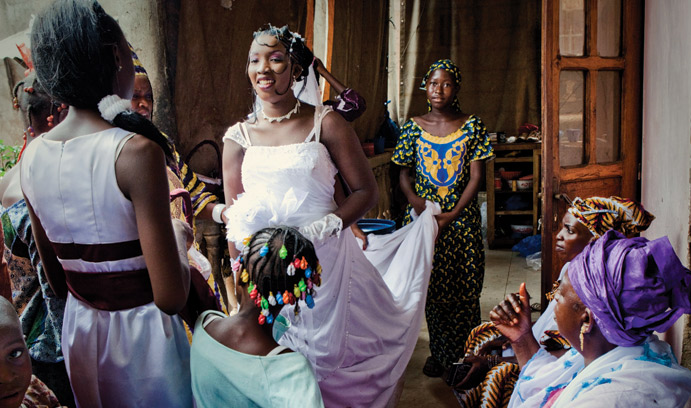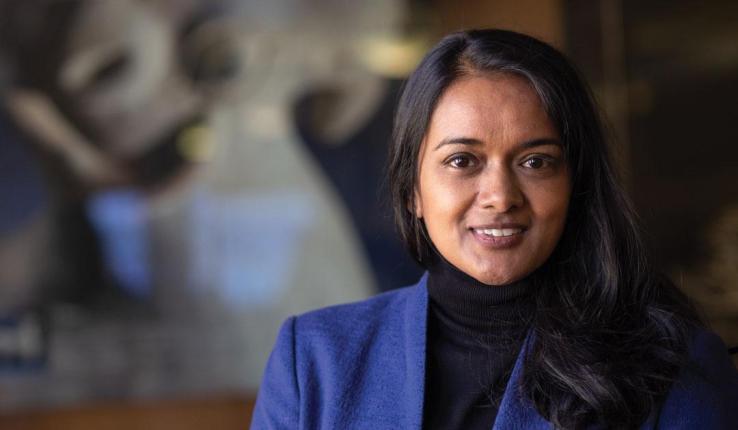The Changing Face of Marriage in Mali

Bruce Whitehouse examines how marriage is understood and practiced in West Africa--and the potential consequences of its changing meaning.
During a wedding ceremony in Bamako, the capital city of the West African nation of Mali, couples pledge their commitment to one another in front of family and friends. Brides wear white dresses, and ceremonies are often followed by elaborate celebrations with food and dancing. At first glance, the practice of marriage in Bamako appears similar to that of many Western cultures.
A check box on the required paperwork for a legally binding civil ceremony, however, draws a distinction.
Malian law requires couples to commit to either monogamy or polygyny when they marry. Checking the box for polygyny—a form of plural marriage in which a man is allowed more than one wife—does not require a man to take another wife at any point, but it leaves the option available. If a couple commits to monogamy, they are legally bound to that type of union unless both parties agree to legally change the agreement.
Fewer than one in five couples in the capital city of Bamako check the monogamy box, says Bruce Whitehouse, associate professor of anthropology. Monogamy, says Whitehouse, has taken on something of a bad name in Bamako.
A matter of trust

Whitehouse, who first traveled to Mali as a Peace Corps volunteer, spent 10 months conducting Fulbright-funded field research on marriage and polygyny in Bamako. He interviewed individuals and led focus-group discussions, asking Malians to share their views and experiences with marriage. He sought to figure out how marriage is understood and practiced in an urban demographic and its impact on larger Malian society.
Whitehouse learned from his interviews that it wasn't just men who didn't want to check the box for monogamy—women were wary of it as well, although for different reasons.
Men avoid checking the monogamy box in order to hold the threat of polygyny over their wives, says Whitehouse. And though marriage provides the social respectability that Malian women seek, many believe their husbands will be unfaithful, regardless of which box they've checked during the civil ceremony. They don't trust the state to uphold the contract of monogamy, so the type of commitment made during the ceremony becomes somewhat inconsequential.
"One inference that I can draw is that there's this really high degree of mistrust between men and women before they get married, and it doesn't necessarily end after they get married. Marriages are perceived as being more brittle than they used to be, and much more oriented toward material gain," says Whitehouse.
The economics of marriage
For a woman in West Africa, says Whitehouse, the number one route to economic security is through marriage.
Women have always had some economic autonomy within marriage, but a husband is expected to provide housing and food for his wife and children, says Whitehouse. In a climate of economic uncertainty in which modern urban households face high unemployment rates and skyrocketing food and housing costs, women are driven to approach their relationships strategically—far from the Western ideal of love, trust and exclusivity within marriage.
"For a woman, it's through her relationships with a man or sometimes multiple men that she winds up providing for her economic needs," says Whitehouse. "Anecdotal evidence suggests that women are taking multiple partners before marriage and possibly during marriage because they want to secure their economic future. And they're coming more and more to see marriage as primarily an economic transaction."
This mindset, says Whitehouse, is causing a great deal of friction between young men and women.
"Women see men as being inherently unfaithful and inveterate liars and manipulators," he explains. "And the young women are saying, 'Well, if they're going to treat us that way, we might as well maximize our return and play these multiple partners against each other.' When you're married, you can divorce that husband and move in with somebody else if he's going to be a better provider for you. I don't think this is that widespread yet, but the fact that we're seeing it at all in this fairly conservative society is very significant."
'A very modern institution'

The urban version of polygyny, Whitehouse discovered, differs from its rural counterpart. During his time in the Peace Corps, Whitehouse lived with a polygynous family in a rural community.
"None of the adults in that family had even a primary school education," says Whitehouse. "It was easy for me to associate polygyny with that context. But you go into the urban setting, and you've got these more elite, educated, modern families, and polygyny is not only on the table, but it seems to be adapting. ... It turns out to be, in some senses, a very modern institution, or at least compatible with modern life."
While rural polygyny can create a sense of unity, with multiple wives living in the same household and raising their children as siblings, a new phenomenon of urban polygyny sees each co-wife and her children living separately and maintaining a deliberate distance from the other co-wives and their children. This arrangement, says Whitehouse, allows wives to maintain the illusion that their union adheres to certain modern norms.
"The love angle is still important and people aspire to that, but it turns out not to be achievable for a lot of them in their daily lives," he explains. "So they wind up falling back on strategies that they hope will at least provide them with some kind of security."
Regardless of intent or approach, marriage is an obligation in Mali, says Whitehouse. Changes to the meaning and practice of the institution affect the entire society.
"It's not a question of if, it's when you're going to get married, and how much of your life you're going to stay married," he says. "[Aside from that certainty], we're seeing that almost everything else connected to marriage is changing in West Africa. I think this is going to put a great deal of stress—already has put a great deal of stress—on relations between men and women, parents and children. I think it's going to have very far-reaching consequences."
Instability in Mali
In early 2012, strengthened by arms from the 2011 civil war in Libya, rebels and Islamist militants gained control of northern Mali, upsetting the country’s relative stability. The nation then experienced a military coup in March of that year, and Islamist rebel groups capitalized on the chaos. A French-led offensive intervened, but remaining militant groups have since attacked Malian soldiers and United Nations peacekeepers. More recently, an attack on a luxury hotel in Bamako in November 2015 targeted civilians. Twenty-two people were killed.
Whitehouse’s blog, bridgesfrombamako.com, provides insight into a nation roiled by unrest and corruption. He writes about the experiences of friends and acquaintances living in Mali.
“That’s how I like to handle some of these big sweeping issues as an anthropologist—to look at it from the lens of particular individuals who are grappling with it in their own lives,” he says.
Whitehouse’s expertise is frequently sought by the U.S. government and the governments of other nations, journalists and non-governmental agencies working in the region. He recently coordinated a special issue of the journal African Security examining the big picture of state sovereignty in Mali and throughout northwest Africa.
“Journalists want to know what might happen next,” says Whitehouse. “I don’t know what might happen next. I don’t think I’m a pessimist. I try to be hopeful for the future, but I also try to be a realist. ... Under the surface there’s a lot that’s wrong, and those problems that had accumulated during the period before the coup, most of them still haven’t been addressed. So I try to draw attention to those problems. They have to do with really basic things like the rule of law, corruption.”
Bruce Whitehouse’s research interests include globalization, the state, migration, medical anthropology, transnationalism and Islam. He received his Ph.D. from Brown University.
Photo by Katie Orlinsky
Posted on:






